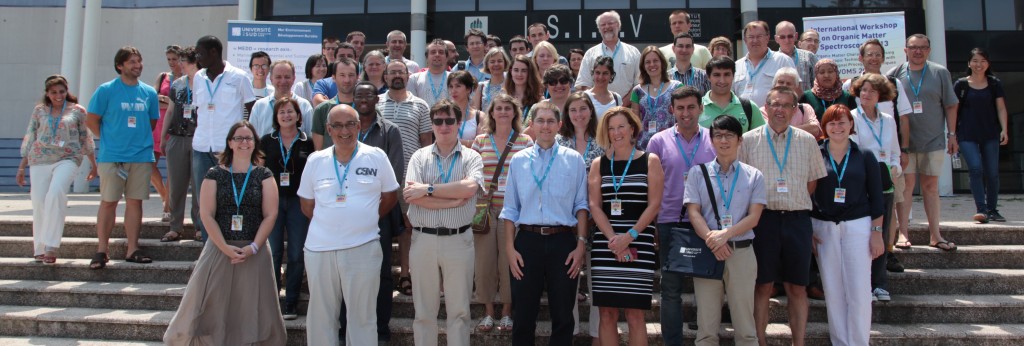This Workshop aims at addressing new trends and recent advances in the characterization of dissolved organic matter (DOM) in marine and inland waters, using spectroscopic techniques associated with advanced signal and image processing tools. It will be the second international workshop dedicated to DOM spectroscopy. The preceding edition of WOMS took place in Granada (Spain) in 2010.
Most of the participants. But where is Cécile ?
WOMS 2013 invites new contributions about the characterization of DOM in marine and inland waters using spectroscopic techniques, particularly fluorescence spectroscopy, coupled with advanced signal and image processing tools, among which improved data analysis, detection, clustering, separation, reconstruction, tracking and real-time monitoring.
The purpose of WOMS 2013 is to provide a forum for discussing new and effective approaches in the area of fluorescence spectroscopy for the analysis of environmental data. WOMS 2013 also offers to signal/image and environment communities the opportunity to meet, in order to strengthen their dialogue and interactions on topics of common interest.
Topics of interest
They include, but are not limited to:
| Fluorescence measurements : | Signal and image processing for fluorescence data: |
| – Physico-chemical parameters influencing the DOM spectroscopic measurements | – Pre- and post-processing (noise reduction, image filtering, smoothing, inner effect correction) |
| – Inner filtering effect correction methods and their domains of application | – Reconstruction of the Fluorescence Emission-Excitation Matrices (EEM) of the separated |
| – Measurement standardization and calibration, instrumental corrections, use of standards | fluorophores from few observations or with possible missing data |
| – Laser-induced, time-resolved fluorescence spectroscopy and lifetime of fluorophores | – Best way to deal with a non-negative and/or sparse constraint |
| – In situ fluorescence, sensors, on-line measurements for environmental monitoring | – Best way to initialize the factorization algorithms |
| – New real-time data processing | – Best way to estimate the number of fluorophores in PARAFAC analysis |
| – Could it be possible to build an international numeric library? | – Detection/decision, estimation and clustering of fluorophores |
Recent trends in non-negative tensors factorizations raise significant theoretical challenges to provide sound mathematical grounds to such methods (non-negative rank, possible sparse constraints, regularization, realtime processing, high dimensional problems and computational cost).
Important Dates
- First Call : January 2013
- Electronic submission: until April 30, 2013 (submission@woms13.fr or by the internet application of the site)
- Notification of acceptance: May 30, 2013
- Deadline for registration:
– end of May 2013 for selected abstract (www.woms13.fr)
– until the D-Day for the other

